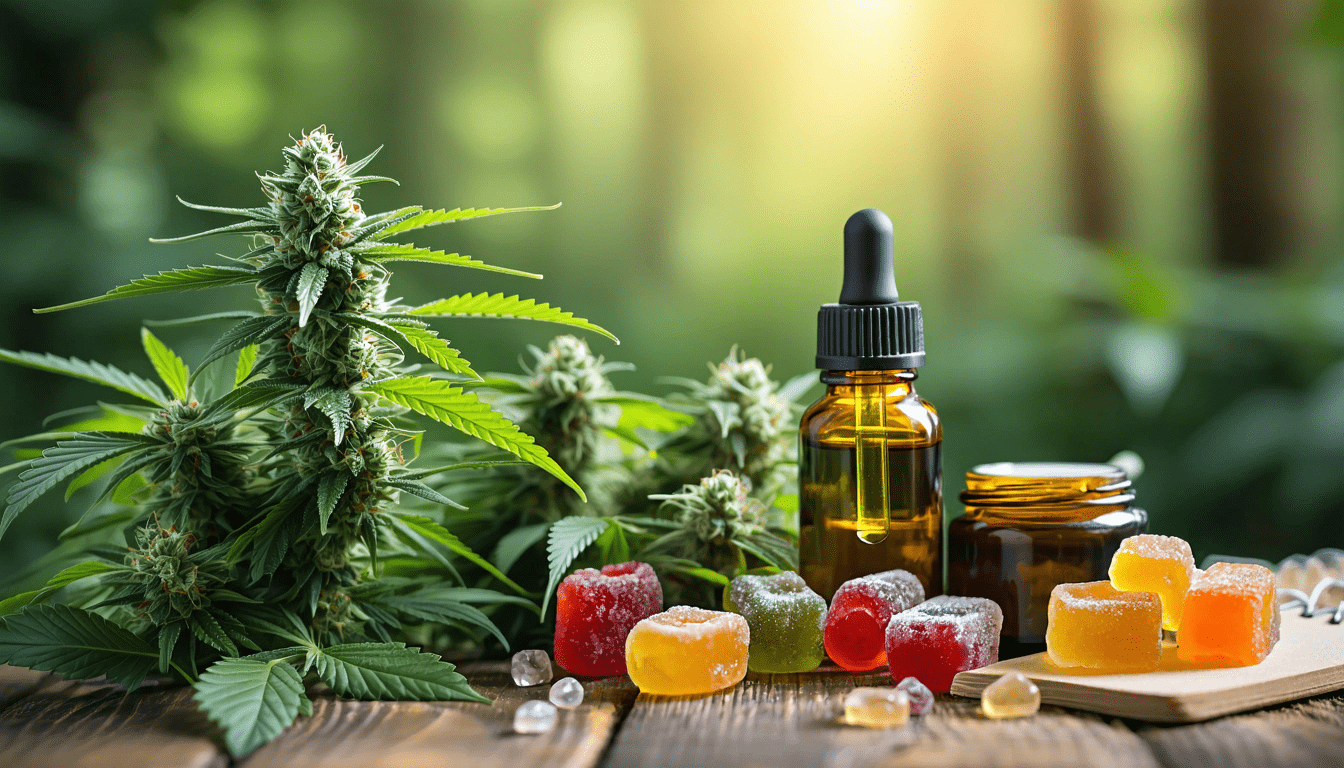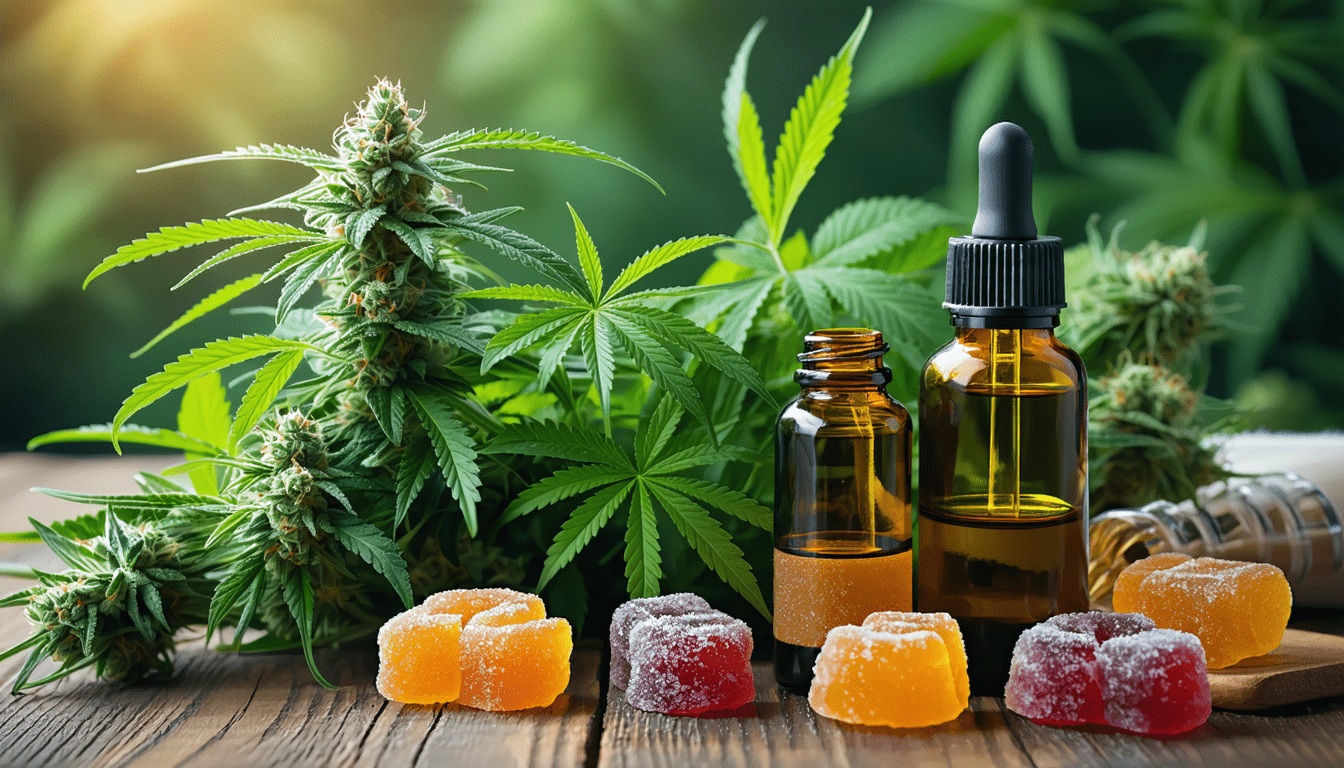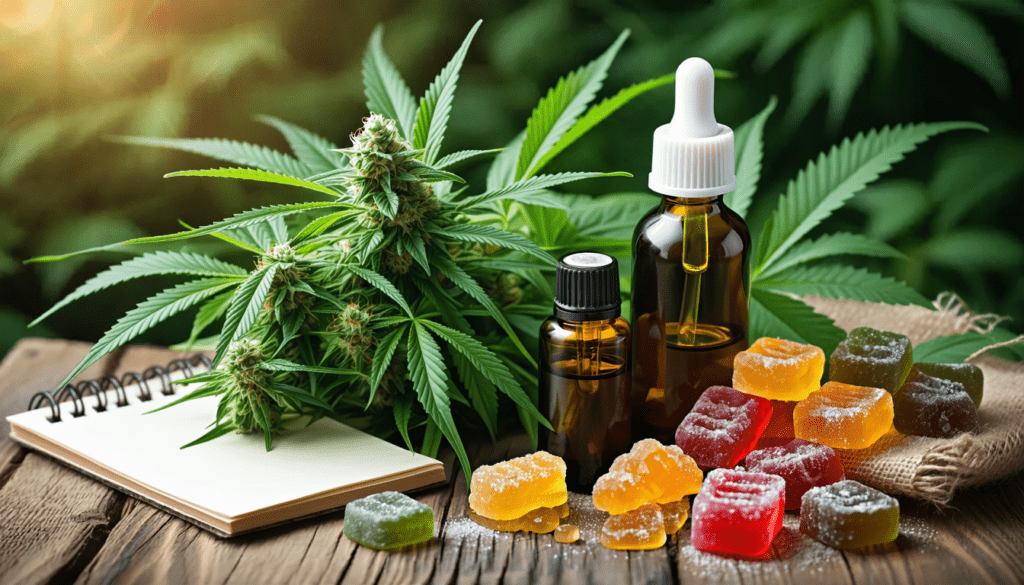|
IN BRIEF
|
Cannabidiol, commonly known as CBD, has rapidly gained attention as a significant component of the cannabis plant, particularly due to its potential therapeutic benefits. Unlike its more infamous counterpart, THC, CBD does not induce a “high,” which makes it an appealing option for individuals seeking relief from various ailments without the psychoactive effects associated with cannabis. Ranging from chronic pain management to addressing anxiety and inflammation, the uses of CBD have captured the interest of many health and wellness enthusiasts. However, as with any emerging compound, there is much to learn about its safety, effectiveness, and potential side effects. Understanding these aspects is crucial for anyone considering incorporating CBD into their health regimen.

Cannabidiol, commonly referred to as CBD, has garnered significant attention in the health and wellness industry. This cannabinoid, derived primarily from the hemp plant, is often touted for its potential therapeutic properties, which range from alleviating chronic pain to reducing anxiety. However, with its increasing popularity come questions and misconceptions. This article aims to clarify what CBD is, its uses, benefits, and important considerations before using it.
What Is Cannabidiol (CBD)?
Cannabidiol (CBD) is one of over a hundred cannabinoids found in the cannabis plant. It is distinct from its cousin, tetrahydrocannabinol (THC), as CBD is non-psychoactive, meaning it does not produce a “high.” CBD is typically extracted from the hemp variant of cannabis, a strain that contains minimal amounts of THC.
Uses and Benefits of CBD
The growing interest in CBD is largely due to its reported health benefits. Many users seek out CBD for its potential to manage symptoms associated with various conditions. Notably, CBD is commonly utilized to treat:
Chronic Pain
Studies suggest that CBD may play a role in relieving chronic pain by interacting with the body’s endocannabinoid system, which regulates pain perception. Many individuals have turned to CBD as a natural alternative for pain relief without the side effects associated with prescription medications.
Anxiety and Stress
Another area in which CBD shows promise is in the management of anxiety. Research indicates that CBD may help alleviate feelings of anxiety by modulating the brain’s receptors for serotonin, a neurotransmitter involved in mood regulation.
Inflammation
CBD is also believed to possess anti-inflammatory properties. This makes it a potential candidate for conditions characterized by inflammation, such as arthritis. Users have reported decreased inflammation and discomfort when incorporating CBD into their routines.
Is CBD Safe and Effective?
While CBD is often well-tolerated, it is not free of side effects. Some users may experience dry mouth, diarrhea, or drowsiness. Moreover, it is crucial to consider that the dosage and product quality can significantly influence effects and safety. Therefore, it is recommended to consult with a healthcare professional before starting CBD, especially for individuals with underlying health conditions or those taking medications.
Key Considerations Before Trying CBD
Before diving into the world of CBD, there are several important factors to consider:
Product Quality
The quality of CBD products can greatly vary. It’s essential to purchase from reputable sources that provide lab results confirming the absence of contaminants such as heavy metals and pesticides. Additionally, understanding whether the product is full-spectrum, broad-spectrum, or isolate can impact its effectiveness. For a comprehensive understanding of these product types, visit this guide.
Dosage
Dosing CBD can be complex, as it varies based on individual needs and body chemistry. A common starting point is to begin with a low dose and gradually increase it until the desired effects are achieved.
Legal Status
The legal status of CBD can differ widely depending on location. It is crucial to be informed about the laws governing CBD use in your area to avoid any legal issues.
Final Thoughts
While the popularity of CBD continues to rise, understanding its complexities is essential for making informed decisions. As with any wellness product, ongoing research is necessary to establish the full scope of CBD’s effects and benefits. For those looking to deep dive into what CBD entails and how it functions, resources such as this comprehensive guide and this detailed overview can provide valuable insights.
Essential Insights on Cannabidiol
| Aspect | Description |
| Source | Derived from the hemp plant or synthesized in a lab. |
| Psychoactive Effects | Non-psychoactive; does not produce a “high”. |
| Therapeutic Uses | May help alleviate chronic pain, anxiety, and inflammation. |
| Common Side Effects | Dry mouth, diarrhea, reduced appetite, and drowsiness. |
| Regulation | Legal status varies by location; often subject to scrutiny. |
| Available Forms | Oil, gummies, capsules, and topical solutions. |
| Onset of Effects | Varies based on delivery method; can be immediate or gradual. |
| Considerations Before Use | Consult healthcare professional, especially if on medications. |

Cannabidiol, commonly known as CBD, has rapidly gained popularity as a prominent natural remedy for various ailments. Extracted from the hemp plant, a cousin of marijuana, CBD possesses a range of therapeutic properties that attract both curiosity and skepticism. This article will provide an overview of what CBD is, its uses, benefits, potential risks, and much more.
What Is Cannabidiol (CBD)?
Cannabidiol (CBD) is a compound belonging to the cannabinoid family, found in the cannabis plant. Unlike its well-known counterpart, THC (tetrahydrocannabinol), CBD is non-psychoactive, meaning it does not create a “high” sensation. This quality makes CBD appealing to those seeking relief without the intoxicating effects associated with marijuana use. CBD can be derived from both hemp and marijuana plants, although hemp-derived CBD is more common due to its legal status in many regions.
Uses and Benefits of CBD
The health benefits of CBD are reported to encompass a wide array of conditions, making it a potentially valuable addition to holistic health approaches. It is most commonly used for treating chronic pain, anxiety, inflammation, and related conditions. Furthermore, research suggests that CBD may aid in reducing symptoms associated with stress and insomnia, allowing individuals to achieve greater relaxation.
Understanding CBD’s Therapeutic Properties
Numerous studies are beginning to shed light on the therapeutic properties of CBD. Many individuals claim that CBD can help alleviate chronic pain and promote a sense of relaxation. Clinical studies support these claims, with findings indicating that CBD may interact with the body’s endocannabinoid system to modulate pain perception and emotional regulation.
Potential Risks and Side Effects
While CBD is often well-tolerated, it carries potential risks. Users may experience side effects such as dry mouth, diarrhea, and drowsiness. It is also important to note that CBD can interact with certain medications, necessitating a consultation with a healthcare professional before incorporating CBD into your regimen. Understanding the potential downsides is essential for making informed decisions about its use.
What to Consider Before Taking CBD
Before starting CBD, there are crucial aspects to consider. While many users report positive experiences, the efficacy and safety of CBD can vary depending on individual health profiles and product quality. Prospective users should ensure they are informed about the different forms of CBD, including oils, gummies, and capsules, all of which can deliver effects in various ways.
Additional Resources
For further insights into the benefits of CBD, readers can explore informative resources such as Unlocking the Health Benefits of Cannabis, which elaborates on the numerous health benefits. The Cannabis Gummies Guide provides a deeper understanding of this popular CBD delivery method. Lastly, you can discover more about the extensive range of benefits offered by CBD oil in the Many Benefits of CBD Oil Guide.
- Definition: Cannabidiol (CBD) is a compound found in the hemp plant.
- Source: Derived from hemp, a cousin of marijuana, or synthesized in a lab.
- Non-psychoactive: CBD does not cause a “high”, unlike THC.
- Uses: Commonly used for chronic pain, anxiety, and inflammation.
- Therapeutic claims: Said to provide relaxation and decrease pain.
- Side effects: Possible adverse effects include dry mouth, drowsiness, and reduced appetite.
- Forms: Available as oils, gummies, capsules, and topical creams.
- Legality: Legal status varies by region; often depends on the THC content.
- Research: Ongoing studies on its health benefits and efficacy.
- Dosing: Recommended dosages can vary; consult a healthcare professional.
Introduction to Cannabidiol
Cannabidiol, commonly referred to as CBD, is a compound derived from the hemp plant, which is a close relative of marijuana. Unlike its psychoactive counterpart, tetrahydrocannabinol (THC), CBD does not induce a “high”. Instead, it is increasingly recognized for its potential therapeutic properties, making it a popular topic among health enthusiasts. This article aims to shed light on everything you need to know about CBD, including its uses, benefits, possible side effects, and considerations before use.
What Is Cannabidiol (CBD)?
Cannabidiol (CBD) is part of a class of compounds known as cannabinoids, which interact with the human endocannabinoid system. This system plays a vital role in regulating a variety of physiological processes, such as mood, pain, and sleep. CBD can be extracted naturally from the hemp plant or synthesized in laboratories, leading to various forms such as oils, capsules, and edibles.
How Does CBD Work?
The exact mechanism by which CBD operates is still under investigation, but it is believed to interact with receptors in the endocannabinoid system. This interaction may help modulate pain, anxiety, inflammation, and other health-related conditions. Additionally, CBD is often hailed for its non-psychoactive nature, making it suitable for individuals seeking relief without the intoxicating effects associated with THC.
Uses of CBD
People turn to CBD for a wide range of uses. Among the most common applications are:
- Chronic Pain Relief: CBD has been reported to help alleviate pain from conditions like arthritis and fibromyalgia.
- Anxiety and Stress Reduction: Many users find that CBD aids in reducing symptoms of anxiety, providing relaxation.
- Sleep Disorders: CBD may help improve sleep quality for those struggling with insomnia or other sleep-related issues.
- Inflammation Relief: Preliminary studies indicate that CBD can reduce inflammation, which is beneficial for various health conditions.
Potential Benefits of CBD
Research highlights numerous potential benefits of using CBD, including:
- Reduced Seizures: CBD has gained recognition for its effectiveness in reducing seizure frequency in certain types of epilepsy.
- Neuroprotective Properties: Some studies suggest that CBD may have neuroprotective effects, possibly helping in the treatment of neurological disorders.
- Anti-Acne Effects: Due to its anti-inflammatory properties, CBD could help in managing acne by reducing sebum production.
Side Effects and Considerations
While CBD is generally well-tolerated, it is important to be aware of possible side effects, which may include:
- Dry mouth
- Drowsiness
- Reduced appetite
- Diarrhea
Furthermore, consulting with a healthcare professional before starting CBD is advisable, especially for those taking other medications, due to potential interactions.
Forms of CBD Products
CBD is available in various forms to suit different preferences:
- Oils and Tinctures: These are often used sublingually for quick absorption.
- Edibles: Gummies and snacks infused with CBD offer an enjoyable way to consume the compound.
- Topicals: Creams and balms containing CBD are often applied to the skin for localized relief.
As the research develops, understanding more about cannabidiol will be essential for those considering its use. With its multitude of potential benefits and minimal side effects, CBD presents a promising avenue for natural health solutions.
Frequently Asked Questions About Cannabidiol
What is cannabidiol (CBD)? Cannabidiol (CBD) is a compound derived from the hemp plant, which is a relative of marijuana. Unlike THC, CBD does not produce a “high” and is primarily used for its therapeutic properties.
What are the common uses of CBD? CBD is frequently used to manage conditions such as chronic pain, anxiety, and inflammation. Its growing popularity is attributed to its natural health benefits.
Is CBD safe to use? Generally, CBD is well-tolerated, but it is essential to be aware that it may cause side effects, including dry mouth, drowsiness, and reduced appetite.
Can CBD help with anxiety? Yes, many users report that CBD helps to alleviate their anxiety symptoms, making it a popular option for those seeking natural remedies.
How is CBD different from THC? While both CBD and THC are compounds found in cannabis, CBD does not have the psychoactive properties that THC does. This means that CBD does not impair cognitive function or create a “high.”
How long do CBD effects last? The effects of CBD can vary depending on the method of consumption but generally last from a few hours to a full day. Individual metabolism and the dosage also play significant roles.
Can I take CBD with other medications? It is crucial to consult with a healthcare professional before combining CBD with other medications, as it may interact with certain drugs.
What forms does CBD come in? CBD is available in various forms, including oils, gummies, capsules, and even topicals for localized pain relief.
Is there a risk of dependency on CBD? Current research indicates that CBD has a low risk of dependency, particularly in comparison to other substances that can lead to addiction.
How can I determine the right dosage of CBD? Finding the appropriate dose of CBD may require some experimentation. Start with a low dose and gradually increase it while monitoring your body’s response.



